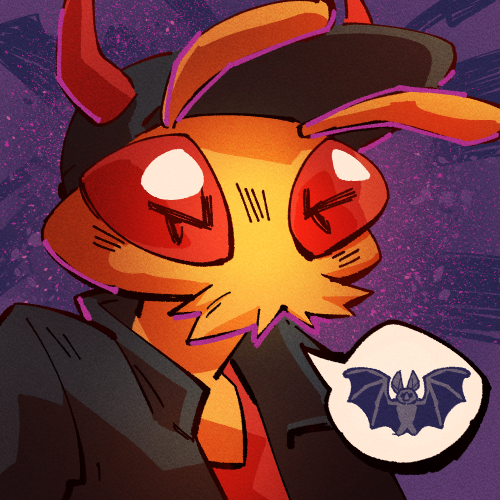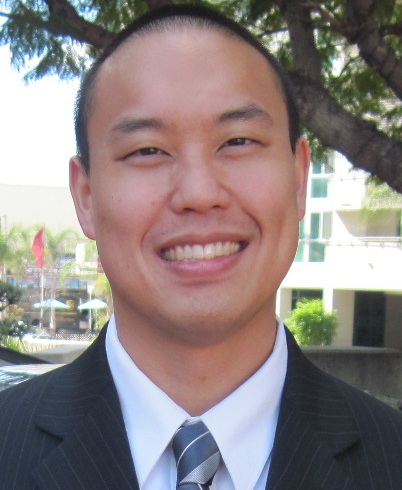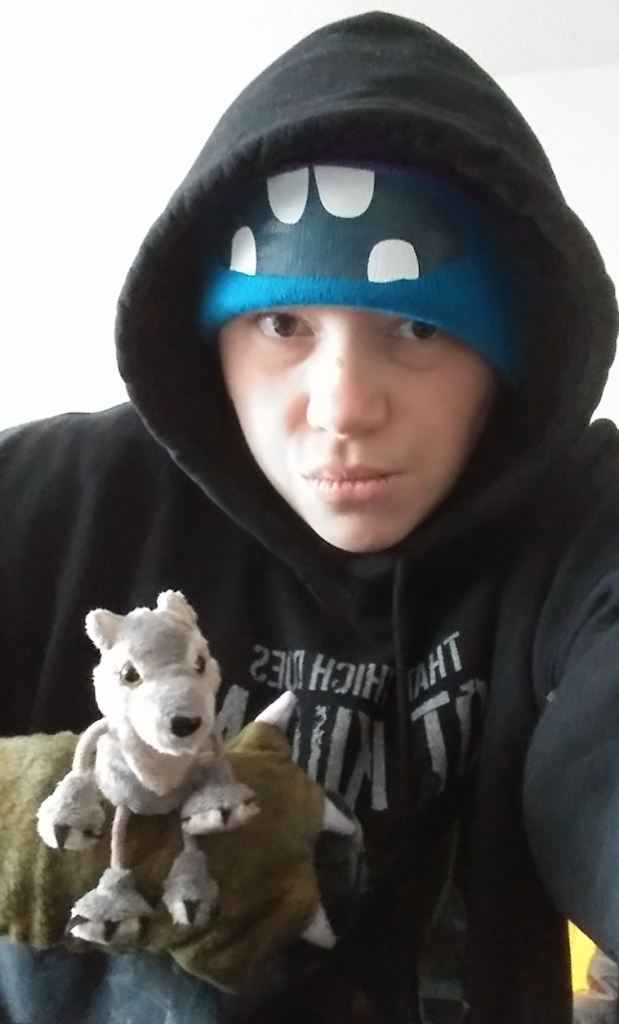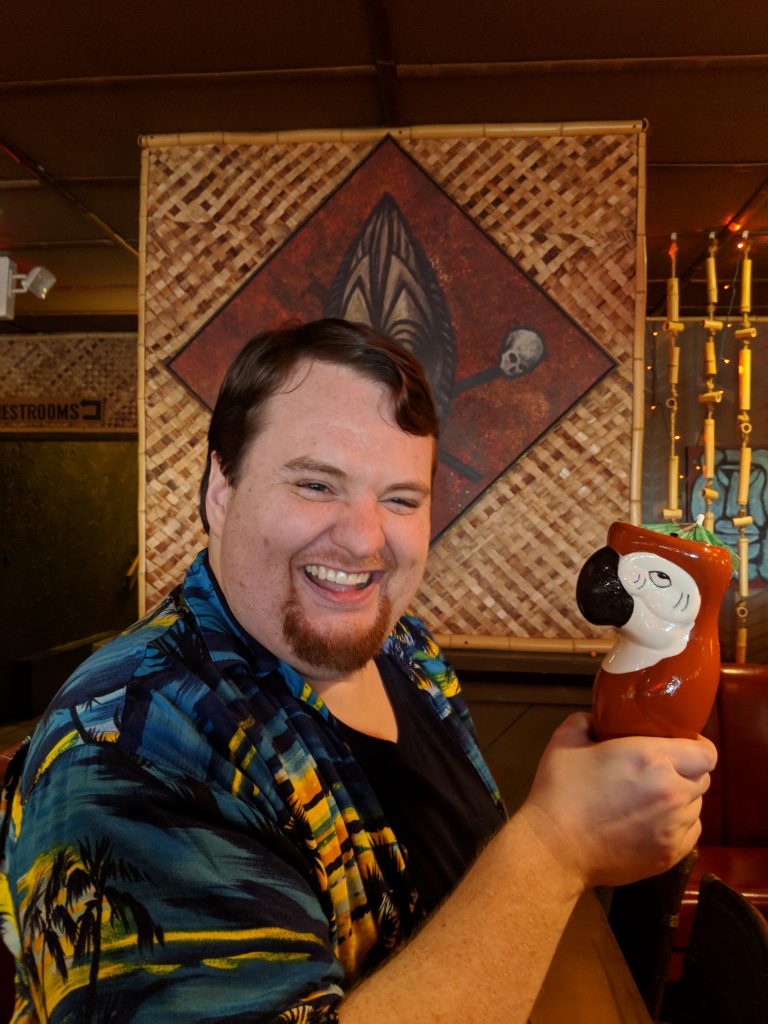VIDEO TITLE: Easy cooking for the family.
DESCRIPTION: Thank you for watching.
TRANSCRIPT:
Dark kitchen, grainy. Camera, low resolution, is pointed at a cooking range with dented skillet resting on it. Both are crusted with food and what appears to be rust. The stovetop paint is flaking off in layers. Over the side of the skillet, a lump which appears to have hair in it is visible. A black sheet has been draped across the counter behind the cooking range. After a moment of rustling, it becomes apparent that hands in black gloves have been in view.
It is unclear if the voice has been dubbed over, but likely belongs to the person cooking. Voice is soft, whispery, and barely audible over the snap of the flame. Audio peaks often.
VOICE: I really— hello. I find cooking videos soothing to watch, so I— I decided to make one of my own. I hope that— I hope that you find it soothing too. To start, I—
The speaker fumbles with the pan. There is a glimpse of stained, cuffed sleeves.
VOICE: I have to make a lot of food, so this pan isn’t— it’s not the best one I could have picked, ah… I’ve done it wrong already.
A hiss. The pan is removed and replaced with a pot. The contents are not visible but slosh when the pot is moved.
VOICE: So— so… let’s start with… an easy thing everyone likes to eat. It—it’s soup. Don’t— don’t criticize me.
The speaker retreats. Chopping is audible offscreen while the speaker continues.
VOICE: In the… you have to sauté it to soften it, but I’m afraid it, er… it’s only gotten harder. That’s… that’s all right. It doesn’t matter. It’s just a stew.
There is a nervous laugh.
VOICE: Oh, it’s— it’s a bone. Here.
There is a thump, and crackle. The pot rattles and begins to bubble over.
VOICE: Then we add it to the— to— it’s boiling— wait—
The camera is knocked to the side, tilting the video. A handful of lump is crumbled into the pot, which causes the liquid to spill over the edges and splash across the stovetop. There is a hissed exclamation and the video terminates abruptly.
*
VIDEO TITLE: I have to cook a lot so I made another video.
DESCRIPTION: The last video was hard to see. I’m sorry.
TRANSCRIPT:
The camera has been moved to above the stove. The video appears to sway in a way that suggests that the camera is suspended rather than mounted. There is a strong light to the right of the video, but the left is in strong shadow. A glistening oil can sits below the light. The dented skillet from the first video sits on the bottom right burner, by the oil.
VOICE: Good— morning. I watched the last one and … this is better now. I’m not— I don’t want to make soup. Today it’s a … gnocchi.
Rustling. With both hands, white pellets are poured into the skillet. They continue to move after being poured into the skillet.
VOICE: These are ones I grew myself, so they’re— you know they’re fresh.
With both hands, the speaker hoists the can and gingerly pours oil into the skillet. While the oil is poured, static and audio distortion increases.
VOICE: The oil keeps— it keeps the can from rusting, so I cover it often… stop it!
The speaker bumps the skillet with their arm, knocking it over. The pellets crawl in all directions after they are spilled.
VOICE: Don’t you understand this is import—
The camera swings wildly. For two frames a thin white hand with too many fingers is visible grasping the black sheet behind the stove before the video terminates.
*
VIDEO TITLE: Unboxing at home. Fun
DESCRIPTION: I made an unboxing. It is a surprise that I haven’t seen unboxed before. There wasn’t anything at the end of the other video. Please don’t leave rude responses I will see them.
TRANSCRIPT:
The camera, tilted, is fixed on a damp cardboard box tied with a string. There are no visible maker or mailing marks on the box. One corner is crumpled in; that corner is stained black. The stain is spreading across the counter, which appears to be the kitchen counter. The lighting is even, but deeply yellow. A tapping which has been audible since the beginning of the video ceases.
VOICE: Hello. I… the cooking was… I will practice so it isn’t so disappointing. Thank you. Today is an unboxing, I…
The speaker reaches into view, and places gloved hands on the box. The speaker appears to be wearing the same stained button-up shirt as in the video ‘Easy cooking for the family.’
VOICE: This is the box… first I untie it…
The speaker fumbles with the string until it comes undone.
VOICE: And then… it’s sealed with… with tape, which I have to cut… I wonder what’s inside? What could have been sent to me?
A nervous, whispery laugh. A kitchen knife with nicked blade is used to saw the box open. There does not appear to be tape holding the flaps together.
VOICE: This is… the hard part because it really has to… hold still. There.
The knife is placed to the left of the box. The speaker gingerly opens the flaps and reaches inside.
VOICE: Now it’s exciting. Aren’t you excited…?
The speaker pulls out a glass jar. The contents are black. White objects float inside. The speaker is excited; their voice pitches up.
VOICE: Oh! It’s my teeth!
The speaker holds the jar closer to the camera. A black fluid runs down the jar from a large crack near the lid. The speaker is audibly disappointed.
VOICE: Oh… it’s leaking…
The hands pull back and footsteps are heard leading away from the microphone. After a full minute of silence, the footsteps return and the video terminates.
*
VIDEO TITLE: Organic gnocchi garden.
DESCRIPTION: It is not a creepy video. It is filmed in my house please stop asking. It is my house. Please stop asking where my house is. It is a private house.
TRANSCRIPT:
The voiceover begins immediately. The camera is held at an average shoulder-height, moving down a dim hall lined with wooden slats. The ceiling is low and does not have light fixtures. The construction style is of the early 1900s.
VIDEO: I had— many people— ah, who asked about the gnocchi. Of course it was good, it’s not… I don’t know what… is that—
Nothing changes in the hallway, but the progression stops.
VOICE: …there isn’t anything. It doesn’t matter, here we are.
The speaker turns, and the camera faces a door the same color as the hall. The speaker, wearing black gloves, fumbles with the door. When the door is opened, a buzzing is audible. The speaker fumbles with a pull string.
VOICE: I keep it in the dark. They said it’s a favorite. It took me a while to figure this out but it isn’t too hard…
The light comes on with a click. The camera sways close to a large. blackening ribcage, mostly stripped of flesh. It appears to be the remains of a cow or pig.
VOICE: Here. And… sorry, I have to open it… a bit strong… ah, if I had another hand— ha ha—
The camera dips as the speaker turns the carcass to face the camera. Black spots buzz across and the speaker hisses and waves them away. A large white blob is visible. After a moment the camera focuses as the speaker pushes it closer. The white is a chest full of writhing maggots. A fly lands on the camera, blotting out half of the video. The voice sounds relieved.
VOICE: And that’s the— my indoor garden.
*
VIDEO TITLE: f
DESCRIPTION: boil
TRANSCRIPT: The camera swings unsteadily over a pot of yellow oil. There is the sound of shallow breathing for eleven seconds before the video abruptly terminates.
*
VIDEO TITLE: fryung with mushrooms
DESCRIPTION: im ok
[A significant amount of hard returns seperate the first two words from the following text:]
I SAW YOU THIS IS YOUR LASRT WARNING STP SNREAKING ARIUBD MY HIUSE
TRANSCRIPT:
There is swinging and as the camera is fixed into place above the stovetop. A large pot is visible; it is filled with bubbling oil. The hands withdraw from the camera before the speaker begins.
VOICE: Today we are going to fry some mushrooms. Um… I found a bunch of them recently…
There is rustling and the speaker holds a porcelain tray up to the camera. On the tray are several mushrooms trailing mycelium. Alongside the mushrooms are lumps that appear to be covered in fuzz.
VOICE: Since it wasn’t very interesting and I don’t know how to do the video skip, I took the oil to boil while I wasn’t recording. I’m sorry if you wanted to see it. I turned it up to the highest setting until it boiled…
The tray tilts and the contents slide into the oil. As the lump hits, there is a pop and sizzle. Oil bursts across the stove and tray. The speaker yanks back with a startled inhalation, jostling the camera. The tray is pulled away. There is the sound of it being set down off-camera.
VOICE: —ah, and then we, and then we wait for it to finish.
There is a forty-second pause in speaking. The camera is set back into its original position.
VOICE: I know how long it’s supposed to cook. Until it…
The contents of the pot blacken as the oil continues to boil.
VOICE: …until…
There is rustling off-screen.
VOICE [mumbled]: Oh, no.
A hand rests on the side of the stove.
VOICE: I forgot the tool to take it out with…
There is a pause. The speaker hesitates over the boiling pot before plunging their hand into the pot. There is a shrill scream. The camera is knocked spinning. The video terminates.
*
VIDEO TITLE: Cooking with a roast beef.
DESCRIPTION: Thank you for concern. Today we will cook a roast beef. Please know I did not disturb the gnocchi for this roast.
TRANSCRIPT:
The camera is pointed at the oven. The door is open, and the interior is blackened. From the color, grime, and lighting it seems to be the same stove as in previous videos. The speaker’s voice is audible from what seems to be behind the camera.
VOICE: I wanted to show— oh. Hello. Today we’re going to… cook a roast. A… a roast beast. Beef.
With a scraping noise, a rusty metal tray is pushed into view. It is held by an unsteady, bandaged hand. On top of the tray are three chunks of rib bone. The shriveled meat on the ribs is tinged green.
VOICE: I… er, I cut the beef… and now it’s on the plate. So the plate goes into the oven, which is hot… I turned it to, er, to [inaudible] degrees… please be careful with hot things. Though it doesn’t— it doesn’t hurt too much, so don’t worry. Thank you.
The speaker slides the tray into the oven, and then carefully closes the oven door. Though there is a glass window, the inside is not visible due to a combination of filth and lack of light. The video continues to record the oven for several hours without interruption.
Nothing changes in the video until 3:41:53, when there is a distant noise of glass breaking and a light flickers. At 4:08:03 there is a muffled scrape and thump, and a possible second voice with an indistinct exclamation. At 4:15:47 there is a metallic shriek, a series of loud bangs, and shouting, speaker undetermined. The shouting ends abruptly with a damp thud. The camera shakes slightly and is not reoriented.
The video continues without note until 5:32:11, when the oven begins to emit smoke, and at 5:46:23 there is a brief flare of red before the ribs visibly catch flame at 5:52:09. The fire continues, smoke obscuring the image, until there is the sound of loud footsteps approaching at a run. The oven door is yanked open.
VOICE [out of breath]: And— and that’s a —
Violent coughing. The video terminates.
*
VIDEO TITLE: How to fix a broken window.
DESCRIPTION: A window is broken so I am going to fix it.
TRANSCRIPT:
The video is clearer, though still filmed at low resolution. The camera is tilted back in view of a broken window. Large shards of glass remain in the splintering frame. The sky is an overcast grey. Shuffling comes from behind the camera before a throat is cleared.
VOICE: Good— good morning. Today is— a window is broken. That’s… that’s not good. Because it goes outside. So anyone could get out. Or … or in. A-anyway. I have… household…
The speaker shakily holds a staple gun in front of the camera with bandaged hand.
VOICE: I tried to sew it, but… the needle broke. And the other thing we needed was… fabric. That you have around the house. Please— please remember, this is a private residence. Okay.
The staple gun is removed and a large piece of translucent, pale fabric, notably marked with brown stains, is held in front of the camera. With rustling, the speaker’s gloved hand holds the fabric up to the window frame. The staple gun is brought up to the gloved hand, and there is over six seconds of hesitation.
VOICE: Oh… shoot.
A third hand, in an ill-fitting black glove, slides into view from the far side of the window. It holds the fabric against the frame.
VOICE: Ah, and then you… just staple it, like this. And like this… over a bit… down…
As they speak, the speaker erratically staples the fabric to the windowframe until the fabric is stretched completely across. It has ragged edges and hangs loosely. The amount of light is greatly diminished. All hands retreat from the frame.
VOICE: Until it’s done. So you can’t just get out.
The speaker’s gloved hand comes back into view, pushing against the fabric with two fingers, outward; it stretches with the pressure, though it is not elastic.
VOICE: Now you can… um… see through it, but not go through it. Ow!
The speaker yanks their hand back, evidently having pricked a finger on the glass. A dark spot remains on the fabric. There is a hiss and whimper before the speaker continues, subdued.
VOICE: So that’s how— how to fix the window.
*
VIDEO TITLE: Cooking with a new ingredient.
DESCRIPTION: I’m sorry.
TRANSCRIPT:
VOICE: —ry again, it’s not wasteful, it’s okay. It’s okay.
Video begins mid-sentence. The speaker’s voice is distressed and nearly inaudible. The camera is close to a skillet, at an angle. The stove appears to have been cleaned, though it is still crusted with rust and stains. The oil can is on the stove, near the skillet. In the corner of the video is the side of a large pot, with what appears to be plastic melted to the side. There is a white plate with a cut of meat about the size of a thigh ham on it; the meat is resting in a pool of bright red juices. The meat appears fresh. There is a several-second pause before the speaker begins again with a shivered inhalation.
VOICE: Hello, um, today I’m making a… sauté. Ah, I… I don’t like it when anything goes to waste, so I try to use all of it… ah… well, so we’re going to bruise in a skillet.
The speaker picks up the oil can with difficulty and coats the surface of the skillet in oil. While both hands are gloved, a bandage is visible around the wrist of the right hand.
VOICE: The skillet is— it’s already on. So the— oil is so it doesn’t stick.
A nervous laugh. The oil can slips from their grip, splashing oil across the stovetop and meat. The can is shoved out of sight.
VOICE: Then— um— then — salt—
The speaker picks a glass container from offscreen and fumbles with it, dropping it; the meat is covered in a pile of fine salt. There is a sharp intake of breath. The container is snatched from the plate.
VOICE: It’s fine. It’s fine. You’re supposed to— to have it sit in the salt anyway. It’s not bad now. I should cook it and it will be fine. It’s good. It’s good to not be wasteful. I’m sorry. I’m sorry. Just put it in the skillet so you can cook it.
A muffled click offscreen. The speaker picks up the meat and places it onto the skillet. They yank their hand away from the pop and sizzle of oil.
VOICE: Ah— then it’s— two minutes. Just two minutes.
There is a pause of 3:06 while the meat begins to smoke. From this point on the video is somewhat obscured by smoke. The sounds of breathing are audible under the cooking. At 3:49 the speaker very quickly flips the meat over with their hand, then shoves the skillet aside and places the plate atop the burner. The blackened meat is dropped onto the plate, splashing juice across the stovetop.
VOICE: Then it… it’s done. And you… you get to eat it. So that’s good, it’s very, it’s delicious, savor it.
The speaker’s hands return to frame with a fork and knife spotted with white and brown stains. They cut into the meat, shakily piecing out a chunk which is stabbed and lifted out of frame. There is the sound of chewing, followed by a choke and retching. The plate is knocked aside, into the pot, which topples, spilling brown liquid across the stovetop. The contents of the pot roll into view. Fused to the inside of the pot is a melted white shopping bag with distorted THANK YOU written across it in red. Within the bag is a swollen, pink lump with finger- or toenails.
The thin sound of sobbing.
The video terminates.
*
The channel was removed shortly following upload of the ninth video.
© 2020 by Rhiannon Rasmussen
Author’s Note: This story was inspired by the myriad wonders and horrors of internet media. It’s really lovely that so many people are brought together by the ability to post online, isn’t it?

Rhiannon R-S is a nonbinary lesbian who lies on stacks of paper dreaming about teeth. For more writing & art, visit rhiannonrs.com. For shitposts & conversation, visit @charibdys on Twitter.
If you enjoyed the story you might also want to visit our Support Page, or read the other story offerings.









